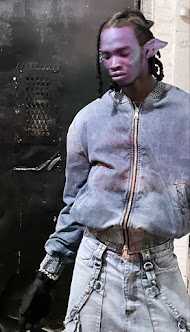MOTOMAMI: Futuristic Flamenco
A year after its release, I've decided to dissect what may be one of the best pop albums from a recent artist in the past decade. MOTOMAMI is an unforgettable third release from Spanish artist Rosalia, an album that is layered with texture and finesse, its flamenco brought into a new sonic timeline, speeding past traditional familiarities. This album pushes Rosalià to a new status in her artistry, an embodiment of her consistent dedication to nurturing her sound, allowing herself to adapt her musical ability to fit into the moulds of any genre she wishes. Rosalia releases her protruding sadness heard in “El Mal Querer”, letting her vocal capability be showcased through contrasting production; creating a necessary nonchalance for her sound. She allows herself to create an album that curates an aura that compliments what it means to be a MOTOMAMI. MOTOMAMI embodies its role without fault, making just under an hour Rosalia contains the experience within a shorter time frame making sure that the length of the songs reflect the intentions of its album title.
Energy transcends in different forms 'MOTOMAMI' being a physical vessel for Rosalia's intention to manifest. This being her third album, it's clear that Rosalia has laid her groundwork as an artist that deserves recognition, gaining international popularity after the release of her sophomore album. Rosalia has an undeniably tasteful production style that's consistent within her work, her writing style is imperative to her artistic vision, using her lyricism to lace implicit feminist expressions throughout the album.
The album commences with ‘SAOKO’ a revamped homage to the classic 'saoco' from Latin legends Wisin and Daddy Yankee. ‘SAOKO’ is Rosalia in a different range vocally, bringing forth a different cadence to her delivery in lines “Yo soy muy mía, yo me transformo, Una mariposa, yo me transformo”. As well as introducing Rosaliàs added new enthusiasm to her vocal outputs in songs it also brilliantly includes an overlooked metaphor itself as an opener, lyrically implying that she's stepping into her new power, like that of a transformer she’s becoming MOTOMAMI. The intention with the opener is clearly tied between the relation of identity and its attachment to whatever physical form it's presented in, Rosalia is implicitly requiring listeners to realise the importance of how your identity can be habituated in its physical form. What's displayed on the outside is only a mere projection of what's covered.
‘MOTOMAMI’ is scattered with intertextuality, references to so many artists and previous works are layered through her songs, both production and lyrically. Sprinkled with name drops of icons like Willie Colon,Lil Kim, M.I.A even Gen Z favourite Frank Ocean. It's clear that she was heavily inspired by other artists' with this album, allowing herself to collaborate with a range of producers to create an amalgamation of different sounds, mixing an electric take on flamenco with reggaeton. Songs like ‘DIABLO’’ and ‘MOTOMAMI’ illustrate Rosalia's take on maximalist production, creating a mindfuck with her production that demonstrates her necessary nonchalance when creating this album, the production is cutting-edge and raw; Rosalia is unafraid to take risks with her new beats completely developing her sound from her last album, a polished project of elegance. The only song that I could imagine Rosalià had to create as a refined single would be the ironic self reflective single ‘LA FAMA’ featuring fan favourite The Weeknd.
Another reason why this album pushes Rosalia to a status of expertise in her field is her meticulous use of sampling placed throughout the album. Even managing to successfully include a popular viral tik tok sound into her song ‘CUuuuuuuute’ without ruining her MOTOMAMI aesthetic, the song is a thoughtful execution of popular humour, tying in her personality within the project. Letting listeners understand her playful personality,she's romantic and expressive, always remembering to express her sexuality with some form of whimsical humour to show that she keeps herself amused with her songwriting skills. A stellar projection of her own personality in her songwriting is ‘HENTAI’ a love song dedicated to her new found love with partner Rauw Alejandro, this tune ties passion and pleasure, hinting at her own kinks and amusement when it comes to her relationship with her boyfriend; even telling us explicitly that she likes a man with a dick piercing. She’s fun like that.
Closing the album with a song that ties in the element of fire was an insightful addition to her project, the cover art of her album dripping in blood red, this album's contents as well as its visual representation is meticulously planned out. The final song 'SAKURA' includes lines “There's only risk if there's something to lose” which is an honest explanation for the risk she's taken with such an experimental album. It's refreshing to hear something so different, an album that is grounded in its own objective,MOTOMAMI is a success story.
Important work is produced when artists allow themselves to take risks with their sound, pop stars always thrive breaking down their curated personas to create new versions of themselves. MOTOMAMI is almost sinister when compared to her previous album, Rosalia ditches the angelic pop star that is innocent and tamed, accessing her imperfections in order to create a project that's honest and daring, uncovering the power that's found in honesty. MOTOMAMI is fundamentally feminine; exploring the concept of harnessing an energy that's ethereal and incredibly powerful, MOTOMAMI is driven by the feminine experience.




Comments
Post a Comment